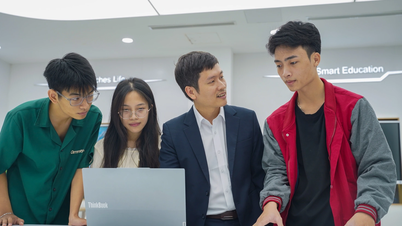It is not surprising to hear about students using ChatGPT and probably many other AI aids to "handle" homework in this or that subject. But there is no reason to ban the use of such aids.
Because it certainly won't be banned. What resources are there to keep an eye on students every minute and every second to ensure they don't touch ChatGPT when smartphones are always in their hands and internet signals seem to be always present in the atmosphere?
It's understandable that schools and teachers are confused. Just yesterday, teachers felt confident because what they taught their students was something they would hear and know for the first time thanks to their knowledge and efforts. But ChatGPT and the vast ecosystem of digital information and knowledge behind it have redefined that. Just yesterday, homework was one of the important tools for practicing pedagogy, putting students under pressure to do exercises to consolidate knowledge, solving difficult exercises to improve thinking ability, now it can lose its effect. I tried "dropping" into ChatGPT a math exercise sample considered to be very difficult, and the application returned the result in just "a minute". And it also included clear step-by-step explanations, and was ready to patiently explain step by step for the parts the reader didn't understand.
I remember when I was in school, it was not unusual to ask adults for help when encountering a difficult math problem, or to ask friends who were better at solving it for you. Of course, it was "exciting" to be able to solve the problem by yourself without asking anyone for help. However, learning how to solve the problem through someone else's guidance was also a common approach. The question is, after being shown how to solve it, do you really understand it, or just copy it mindlessly?
Now all those who can help students solve difficult exercises, explain new lessons in school years can "incarnate" into a single character named ChatGPT. Thinking positively, this way, they will learn faster, learn more, and understand more deeply if they want.
And the worrying thing lies in the two words "if you want". If you really want to learn, to expand your knowledge, to understand the problem deeply, to improve your thinking, you will learn in a completely different order than those who just want to learn to get it over with. If you really want to learn, then using ChatGPT to find suggestions for essays, to solve math problems is not a bad thing. But if you learn to cope, of course you will turn ChatGPT into a "substitute" for your brain, and that will certainly make your brain gradually shrink.
So the teaching method of teachers will also have to stop looking at the final result because simply, the result of a very "deliciously" solved exercise is done by ChatGPT. Think more about applying the "flipped classroom" model, where instead of being prohibited from exploiting ChatGPT, students are allowed to use it on the condition that they must present their own interpretation of the result in class. Give students more opportunities to practice the skills of exploiting ChatGPT effectively, and put students under pressure to explain what they receive from ChatGPT support.
Source: https://thanhnien.vn/lop-hoc-dao-nguoc-voi-chatgpt-185241115234147223.htm




![[Photo] Chu Noodles - the essence of rice and sunshine](https://vphoto.vietnam.vn/thumb/1200x675/vietnam/resource/IMAGE/2025/11/11/1762846220477_ndo_tl_7-jpg.webp)
![[Photo] Prime Minister Pham Minh Chinh chairs a meeting on housing policy and the real estate market.](https://vphoto.vietnam.vn/thumb/1200x675/vietnam/resource/IMAGE/2025/11/11/1762838719858_dsc-2107-jpg.webp)
































































































![Dong Nai OCOP transformation: [Article 4] Reaching national standard products](https://vphoto.vietnam.vn/thumb/402x226/vietnam/resource/IMAGE/2025/11/11/1762825820379_4702-cac-san-pham-trai-cay-chung-nhan-ocop-nongnghiep-174649.jpeg)


![Dong Nai OCOP transition: [Article 3] Linking tourism with OCOP product consumption](https://vphoto.vietnam.vn/thumb/402x226/vietnam/resource/IMAGE/2025/11/10/1762739199309_1324-2740-7_n-162543_981.jpeg)






Comment (0)